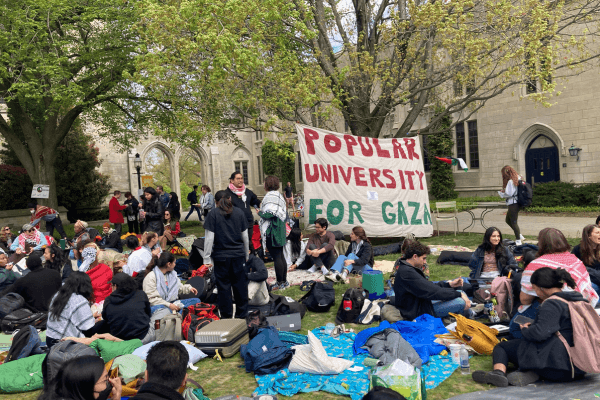I’ve been a vegetarian for 10 years.
Ash Wednesday 2020 marked a meat-free decade for me, a spiritual choice I made in 2010, just after I became engaged to a devout Hindu. What began as both a Lenten fast of solidarity and desperation — my husband is the cook, I am not — has held steady. A liturgical season turned into a year, then another and another. At each meal, I’ve made choice: Do I eat meat or not? Why or why not?
Over time, the why emerged. I worship a Triune God whose gospel ethos is nonviolence. While my Lenten fast began as an adaptation to live in partnership with a Hindu whose adherence to ahimsa (nonviolence toward sentient beings, including animals) is a core teaching, I realized that going meat-free would not be too far off Jesus’s mark.
“Why do you still fast from meat?” friends ask, long after my Lent 2010 concluded. Because I now consider vegetarianism an essential Christian spiritual practice.
Jeania Ree V. Moore writes, “Fasting, if done right, is an experience of surrender. In decreasing our intake, fasting makes space for something else. In fasting, we are listening for God." The Lent 2020 Call to Prayer, Fasting, and Repentance reminds us that fasting redirects our attention. It attunes us to solidarity — commensuration with our “health, situation, and communities.” When we fast, we wake up. Fasting in and of itself is an interruption of the norm, an invitation to recalibrate our time and focus to something deeper.
By not eating animals, I’ve woken up.
I’ve woken up to the injustices and oppression of factory farming. I’ve woken up to the incessant violence we commit toward our planetary home. I’ve woken up to the fact that as a Christian, I am called to live into practices that fulfill my commandment of loving God and loving neighbor. If I love God and love my neighbor, I am mindful of my neighbor’s livelihood — and our home together.
But vegetarianism is not easy. No spiritual practice is.
While many were certain our “unequally yoked” clash of East-meets-West marriage was certain to fail, my husband and I focused on its strengths and gifts. We committed to two practices we hoped would keep us married and happy: Mine was vegetarianism; his was worshipping together. We observe one another’s diets and holy days.
It’s a spiritual immersion that, surprisingly, makes for full bellies — and perhaps less surprisingly, full calendars. But, contrary to what I thought would happen, it was the fasting from meat that made the biggest difference to me. Keeping a vegetarian diet beyond Lent helped me rediscover the ancient Christian church’s discipline of abstaining from food for spiritual benefit.
But Protestants are usually the last to line up for a fast. Even as I write this, I’m teaching a Wednesday night Lenten supper series whose “vegetarian” option will consist of hush puppies. Our aversion to anything that seems remotely Catholic throws out the proverbial baby with the bath water. Though my denomination might be the last one to (re)join the discipline of food restriction, modern-day fasting offers us an opportunity to recalibrate.
There are good days in Christian vegetarianism — well-planned, nutrient-rich meals —and there are bad days of vending machine buffets. But this is the nature of fasting — and of spiritual practice. Intention matters. Discipline matters. But isn’t that the very point? Fasting implores me to embrace humility. I am not the Creator, but I am a steward of creation. I am a human in need of grace, dependent upon a complex web of other sentient beings.
Fasting draws us closer to God and one another. As we push through the discomfort of not eating meat, we recognize ourselves more than a machine that must be fed at any cost — including hazardous conditions for workers, animals, and a planet warmed by methane gas. Fasting reminds us we are spiritual beings following a gospel whose ethos is ahimsa (nonviolence) and thus, we are called to compassion for all.
This Lent, I encourage all of to go meat-free, even if only on Wednesdays. What might happen when we exchange unlimited consumption of animals for moderate consumption of plants? What might be the spiritual results? What might be the planetary results? The possibilities are endless.
Got something to say about what you're reading? We value your feedback!







